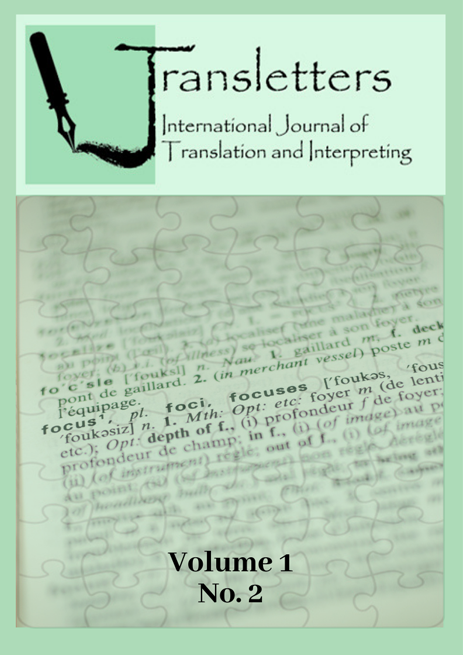Known Knowledge and Non-lawyer Translators’ Understanding of the Language of the Law
Contenido principal del artículo
Resumen
- Abstract: This paper will explore the relationship between what has already been known by most translators as non-lawyers and the specific meaning they want to know in their venture into understanding a special expression in law language. Based on domain-general concepts extracted from the available semantic information, non-lawyer translators’ understanding also involves a process of transferring their known knowledge and detecting the path linking known knowledge and the newly encountered meaning, so as to make an optimal use of all their known knowledge and gradually move toward the possibility to achieve their correct understanding.
Descargas
Detalles del artículo
Política propuesta para las revistas que ofrecen acceso abierto
Los/as autores/as que publican en esta revista aceptan las siguientes condiciones:
1. Los/as autores/as conservan los derechos de autor y conceden a la revista el derecho de primera publicación con el trabajo licenciado simultáneamente bajo una Licencia de Atribución de Creative Commons, la cual permite a otras personas compartir el trabajo con un reconocimiento de la autoría del trabajo y la publicación inicial en esta revista.
2. Los/as autores/as pueden establecer acuerdos contractuales adicionales para la distribución no exclusiva de la versión publicada del trabajo en la revista (por ejemplo, enviarlo a un repositorio institucional), con un reconocimiento de su publicación inicial en esta revista.
3. Se permite y anima a los/as autores/as a publicar su trabajo previo a la versión final publicada en esta revista una vez aceptado (por ejemplo, en repositorios institucionales o en su sitio web), ya que puede dar lugar a intercambios productivos, así como a una citación más temprana y mayor del trabajo publicado (Véase El efecto del acceso abierto).

